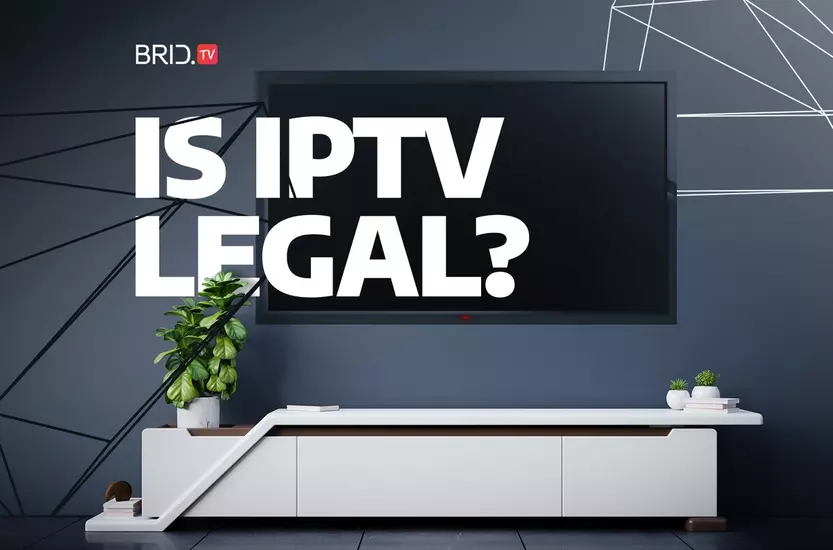If IPTV is an entirely new concept to you, you probably have many questions. One of the most burning ones is probably if IPTV is legal. After all, having access to hundreds of channels and TV shows at all times may sound too good to be true.
Don’t worry; IPTV is perfectly legal in most parts of the world.
However, it’s not all sunshine and rainbows. There are some bad actors in the industry that operate illegally.
That’s why it’s crucial to familiarize yourself with the laws surrounding IPTV and learn how to identify illegal IPTV services to protect yourself.
But before we get to it, If you have any questions about IPTV and how it works, check out our comprehensive guide to IPTV. With that out of the way, here’s a detailed guide on the legality of IPTV to help keep you informed.
Is IPTV Legal?
IPTV is legal in most parts of the world. However, the laws behind IPTV regulation are pretty complex and may vary between countries.
First things first, IPTV is an online-based service, and internet laws are still in their infancy. That means most of the existing online-related regulations are vague or outdated. However, there are still many that affect IPTV to ensure consumer safety.
Let’s immediately get one thing out of the way — all major IPTV providers own licenses to the content they offer, and their services are entirely legal. Some of the major names in the industry that fully abide by the law are:
- Hulu
- Sling TV
- DirecTV
- Pluto TV
There are many more than just the above four, but these are well-established brands you cannot go wrong with.
But let’s say you don’t want to settle with either of these. In that case, you’ll need more information to make an educated decision. That’s why we’ll start by covering the basics of the laws that might affect IPTV providers in your country or state.
You Might Also Like: What Is OTT: A Definitive Guide to Over-the-Top Streaming
IPTV Laws in a Nutshell

The two most prominent laws that affect IPTV providers in the U.S. are the Digital Millennium Copyright Act (1998) and Protecting Lawful Streaming Act (2020).
The DMCA is the oldest law passed to regulate copyright law on the internet in general. According to this law, content providers on the internet must purchase correct licenses to get streaming permissions. That also applies to IPTV providers.
Anyone who breaks the DMCA is susceptible to substantial penalties (usually in the form of financial fees). However, enforcing this law was (and still is) incredibly challenging. The technology to effectively do it at scale is lacking. That is why few ever got punished by this law and why there are still many illegal IPTV providers out there.
The prosecution rates significantly increased with the introduction of the Protecting Lawful Streaming Act in 2020. This recent law gave the U.S. Department of Justice more freedom to enforce penalties on any bad actors in the industry.
In Canada, the law regulating online copyright is called the Copyright Act, which works similarly to the American DMCA.
Can You Be Fined for Using Illegal IPTV Services?
Yes, you can. However, that rarely happens. It’s much more likely that your country will pursue legal action against the IPTV provider than you as the individual.
Either way, you should stay on the right side of the law just to be on the safe side.
But how do you identify if an IPTV service is legal or illegal? Here are a few guidelines to help you in that regard.

When Is IPTV Legal?
IPTV is legal if the service provider adheres to copyright infringement laws. That means they must obtain a license for every show or program they provide.
Identifying whether an IPTV provider has adequate licenses can be tricky, though. Here are a few surefire indicators that they are legitimate:
- They link to their partners.
- They have a dedicated streaming app.
- Most legitimate IPTV providers use minimal ads and opt for a subscription-based monetization model instead.
- Most legal providers also sell other services (e.g., internet, telecommunication) besides IPTV.
If a provider checks the above boxes, it’s likely a safe one to subscribe to.
When Is IPTV Illegal?
One can never be 100% sure when identifying an illegal IPTV provider. However, you can often spot many hints that should immediately raise red flags:
- They are hosted offshore.
- The provider is associated with streaming or downloading TV content without permission or a license.
- They offer channels that aren’t licensed in your country.
- They don’t mention their partners.
- Their services are free or unusually cheap (licenses are expensive).
- They suggest you use a VPN for the optimal experience.
- They encourage paying with untraceable payment methods like cryptocurrencies.
If you notice any of the above when looking into an IPTV provider, be wary — they might be offering illegal services. Avoid such providers at all costs.
Why You Should Avoid Illegal IPTV Services
As we previously mentioned, even though most of the legal burden falls on the provider streaming copyrighted content, viewers can also suffer penalties. Even though that rarely happens, there are many reasons to avoid illegal IPTV services besides suffering legal consequences.
- You may get scammed — Nothing prevents the fraudulent provider from accepting your subscription payment and disappearing from the face of the Earth. Since the provider operates under the law, you have no legal means to protect yourself from scammers.
- Viruses and malware run rampant — Many illegal IPTV sites have malware everywhere. In today’s world, where our PCs store most of our private data, it’s not worth risking having that data stolen.
- Poor user experience — These illegal IPTV streaming sites usually have a poor user experience. Whether that’s the case because of many intrusive ads or poor player loading times, your experience will be far from smooth.
- Your ISP could downgrade or disable your internet — Users found to participate in piracy regularly may suffer consequences at the hands of their internet service providers in some countries. ISPs might decide to downgrade their services or disable them entirely.
As you can see, there are plenty of potential consequences for using illegal IPTV other than getting prosecuted. We don’t know about you, but we don’t think risking it is worth it.
You Might Also Like: OTT vs. CTV — All the Differences Explained
Types of Illegal IPTV Services to Watch For

There are three primary types of illegal IPTV services to be wary of:
Shady Websites
Many reliable IPTV services offer users streaming and video-on-demand services, but there are at least twice as many illegal ones. That is why it’s vital to do in-depth research on an IPTV site before subscribing to their services. So always check whether the site owners have licenses to stream the offered content to ensure you aren’t at risk of breaking the law.
Illegal Plugins
Most IPTV services need a set-top box to work; some even come with special plugins to access IPTV streams.
However, while there are many official plugins by reputable IPTV providers, some illegal ones also exist. Some of these third-party plugins are designed to leech streaming feeds from legitimate IPTV providers and serve them as their own without paying for any licenses.
It should be abundantly clear that the above is illegal and could carry severe consequences. So only use IPTV plugins from trusted sources.
Third-Party Subscription Services
Last but not least is third-party IPTV subscription services. It doesn’t take much more than a quick Google search to find dozens of websites offering global IPTV streaming for as low as $5/mo. Such low prices have illegal written all over them. Getting a license, especially for global IPTV coverage, is expensive, and not even some of the biggest legal IPTV providers offer that.
Some illegal websites look surprisingly trustworthy, even featuring apps or fully-fledged guides. But don’t let appearances fool you — always do thorough research to identify whether the site you stumbled upon is legal or not.
Verified and Legal IPTV Service Providers
We’ll help you with your research by suggesting a few reliable providers of our own. You can rest assured the following IPTV services are verified and fully legal:
- YouTube TV
- FuboTV
- Hulu
- Pluto TV
- Plex Live TV
- AT&T TV
- XUMO
- Smart IPTV
- iMPlayer
- XCIPTV
- And more…
Besides these, an easy way to tell if an IPTV service is verified and legal is if they have apps on Google, Amazon, or Apple App stores. These tech giants thoroughly scrutinize all apps and providers before accepting them on their stores. So you can rest assured all services that pass their inspection are risk-free.
What If I Want to Launch an IPTV Service Myself?
If you’re a news or media network and wish to launch an IPTV service, you can do that as long as you follow all the laws and regulations we discussed. Just make sure to keep the following things in mind:
- Purchase all the necessary content licenses under online copyright laws.
- Ensure your IPTV service is malware-free.
- Only use registered and traceable payment methods.
However, keep in mind that launching an IPTV service is incredibly expensive. The infrastructure required to build an IPTV business is complex and requires a substantial initial investment.
There is a much easier way to reach broader audiences than IPTV, though — by making an OTT app.
OTT and IPTV use similar technologies to deliver videos to viewers worldwide and adhere to the same laws. However, starting and maintaining an OTT streaming service costs much more than IPTV.
The easiest way to enter the OTT market is to build an OTT app. With Brid.TV, you can easily launch an app across various devices within days. Publishers can use one of our white-label OTT apps for Android, Android TV, iOS, Apple TV, and Samsung and LG Smart TVs to get in front of new audiences at the fraction of the cost of IPTV.
If expanding your viewership is your goal, get in touch with us, and we’ll help make it a reality.

FAQ
Is IPTV legal?
IPTV is legal in most parts of the world as long as the IPTV provider has purchased the rights to stream content from its respective owner.
Is IPTV illegal?
IPTV is legal worldwide as long as the services provider purchases appropriate licenses to stream that content. Illegal IPTV providers are only those that do not have licenses for their content and are thus infringing on copyright laws.
Is IPTV legal in the USA?
Yes, IPTV is legal in the U.S. as long as the provider you’re streaming from has purchased the appropriate licenses for the streamed content and is not infringing any copyright laws.
Is IPTV legal in Canada?
IPTV is legal in Canada as long as the service providers abide by the global copyright laws and purchase a license for the content they plan to stream.
Is IPTV legal in Europe?
IPTV is legal in Europe if the service providers buy the rights from the respective content owners before streaming. Streaming pirated content or content infringing on global copyright laws is illegal in Europe.
Is IPTV legal in the UK?
IPTV is legal in the U.K. as long as the content streamed isn’t pirated. Providers must purchase appropriate licenses from respective content creators before being legally allowed to stream.

